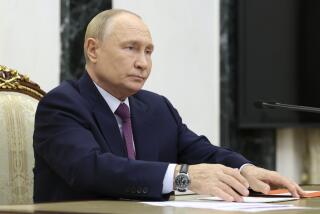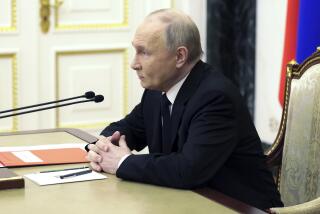Yeltsin Supported on Charter Principles : Russia: Assembly approves stance on new constitution. Action seems at only halfway point.
- Share via
MOSCOW — President Boris N. Yeltsin, taking one more laborious step toward a new Russian constitution, persuaded a special assembly Wednesday to approve a declaration outlining the basic principles of the country’s new charter.
The declaration, which passed overwhelmingly, breaks noticeably from Russia’s old Communist order in that it would guarantee private ownership and do away with the oversized, Soviet-style Congress of People’s Deputies that has been Russia’s supreme power.
“Today there is reason to say that a single coordinated draft constitution is emerging,” Yeltsin said, beaming.
The Russian president downplayed the difficulties that made Wednesday, originally the constitutional convention’s deadline for producing a new draft, into more of a halfway point.
He called for a suspension of the 700-member assembly’s work so that a smaller group can reconcile hundreds of comments into a single draft over the next 10 days.
The convention, a diverse gathering of everyone from priests to party leaders, has no legal power, but Yeltsin called it together to give added legitimacy and momentum to his drive to replace the outmoded Soviet-era basic law. But judging by the many controversial issues that Wednesday’s declaration skirted, Yeltsin still has a long way to go.
The president even announced as he read the declaration that he had left out two paragraphs that had caused too much contention. Both dealt with the relative weight of various republics and regions.
“Many will sigh with relief at this,” Yeltsin commented.
The basic provisions laid out in the declaration include solid guarantees of basic human rights, property protection and free economic activity, as well as a clear separation of powers and extensive local control.
“Human dignity is inviolable,” it states. “Nothing may serve as grounds for its infringement.”
If and when the convention reaches agreement on a single draft, it remains unclear how Russia will ratify it.
The Congress of People’s Deputies, heavily weighted with conservative ex-Communists, is the body charged with all constitutional change, but it is unlikely to pass the new charter.
Yeltsin has publicly toyed with the idea of holding a referendum on the new constitution, or possibly of holding elections for a special constituent assembly like the one broken up by the Bolsheviks in 1918.
He called Wednesday for a panel of the convention to work out a next-step proposal.
Yeltsin also appointed a panel to work out a new Russian law on elections that would allow balloting as early as this October.
Stymied by constant clashes with Parliament despite the heavy vote of confidence he received in an April 25 referendum, Yeltsin is pushing for new parliamentary elections to break the immediate government paralysis.
He wants the new constitution to keep such government battles from recurring by delineating a better balance of powers.
Parliament Chairman Ruslan I. Khasbulatov, Yeltsin’s political nemesis, stalked out of the assembly June 5 and has not returned, first because of poor health and now because he is on a trip to Turkey.
His continuing resistance threatens to torpedo the convention’s work, which could amount to nothing if it is not backed by Parliament’s lawmaking power.
“Nothing for me would be unexpected, even if tomorrow one constitution was being passed in one building and a whole different one was passed in another building,” observed Viktor Stepanov, leader of the Russian republic of Karelia.
More to Read
Sign up for Essential California
The most important California stories and recommendations in your inbox every morning.
You may occasionally receive promotional content from the Los Angeles Times.













